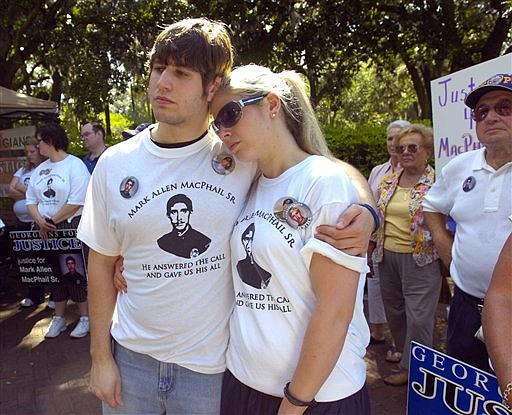SAVANNAH, Ga. - A federal judge heard new testimony Wednesday in the case of a Georgia death row inmate given a rare chance by the U.S. Supreme Court to prove his innocence nearly 20 years after a jury convicted him of killing a police officer.
Attorneys for Troy Anthony Davis say witnesses who identified him as the killer of Savannah police officer Mark MacPhail during Davis' 1991 trial were pressured by police into making false statements. New witnesses have since come forward to say another man confessed to the slaying after Davis was convicted.
In U.S. District Court on Wednesday, Davis' lawyers rested their case after calling nine witnesses to support that claim. The hearing will continue Thursday with prosecutors presenting rebuttal evidence.
Judge William T. Moore said he's highly skeptical of testimony that another man has admitted to shooting MacPhail, because Davis' attorneys did not subpoena the man they say is the real killer.
"This hearsay testimony is looked at with suspicion and great caution," said Moore, who told attorneys he may give the claims "no credence whatsoever when I make my ruling in this case."
Davis, 41, won a rare chance to argue he was wrongly convicted of killing MacPhail, an off-duty police officer who was shot as he rushed to help a homeless man being attacked near a downtown bus station.
Davis sat in the courtroom Wednesday wearing his white prison uniform and chains on his ankles, while dozens of his supporters from groups including Amnesty International and the NAACP rallied outside the courthouse.
Federal death penalty appeals usually look only at questions of due process and constitutional rights. But the nation's high court last summer took the unusual step of granting Davis a chance to prove his innocence.
Legal experts say the Supreme Court set a tough standard for Davis. The court's August decision said his attorneys must "clearly establish" Davis' innocence.
Two witnesses, Anthony Hargrove and Benjamin Gordon, testified that Sylvester Coles - who was with Davis when the slaying occurred in August 1989 - later confessed to each of them that he shot MacPhail.
Hargrove said he and Coles were smoking marijuana together years ago when Coles told him, "You know, I shot a cop over there. ...Troy took the fall."
Gordon, who is related to Coles by marriage, testified Coles made a similar confession to him. Gordon also said he witnessed MacPhail's shooting and was certain it was Coles who fired the gun.
Although Gordon was a witness at Davis' 1991 trial and later signed affidavits for Davis' defense team in 2003 and 2008, Wednesday was the first time he said he was an eyewitness to Coles pulling the trigger.
"What made you change your story today?" Beth Burton, an assistant Georgia attorney general, asked Gordon. "You didn't think that was important to say earlier?"
Gordon said he had been afraid Coles might harm his family, but decided to speak up because "I've had this burden on me for a very long time."
The judge pressed Davis' attorneys on why they didn't call Coles as a witness so he could respond to the accusations.
Davis' lawyer, Stephen Marsh, replied: "There's no reason to believe Mr. Coles is going to come in here and say, 'Yes, I did.'"
Coles refused to discuss the case with The Associated Press when contacted during a 2007 court appearance. He has no listed address or phone number.
Also Wednesday, two witnesses said they lied when they told jurors in 1991 that Davis had confessed to killing MacPhail.
Kevin McQueen said he concocted the story to get back at Davis because they had a feud in jail while Davis was awaiting trial.
"I made up a lie saying that he told me he shot a police officer," McQueen said. "He never confessed to shooting anybody."
Jeffrey Sapp, one of Davis' former neighbors, also testified in the 1991 trial that Davis described shooting MacPhail. On the witness stand Wednesday, Sapp said police pressured him into making that statement.
"I was so scared that I told them anything that they wanted to hear," Sapp said. "They kept saying, 'Just say Troy told you.'"
Burton noted that jurors heard Sapp back off parts of his story in 1991. According to the trial transcript, Sapp stuck to his claim that Davis confessed but said many details he'd told police "I just made up."
Davis has been scheduled for execution but spared three times, though each of his previous appeals have been ultimately rejected.
